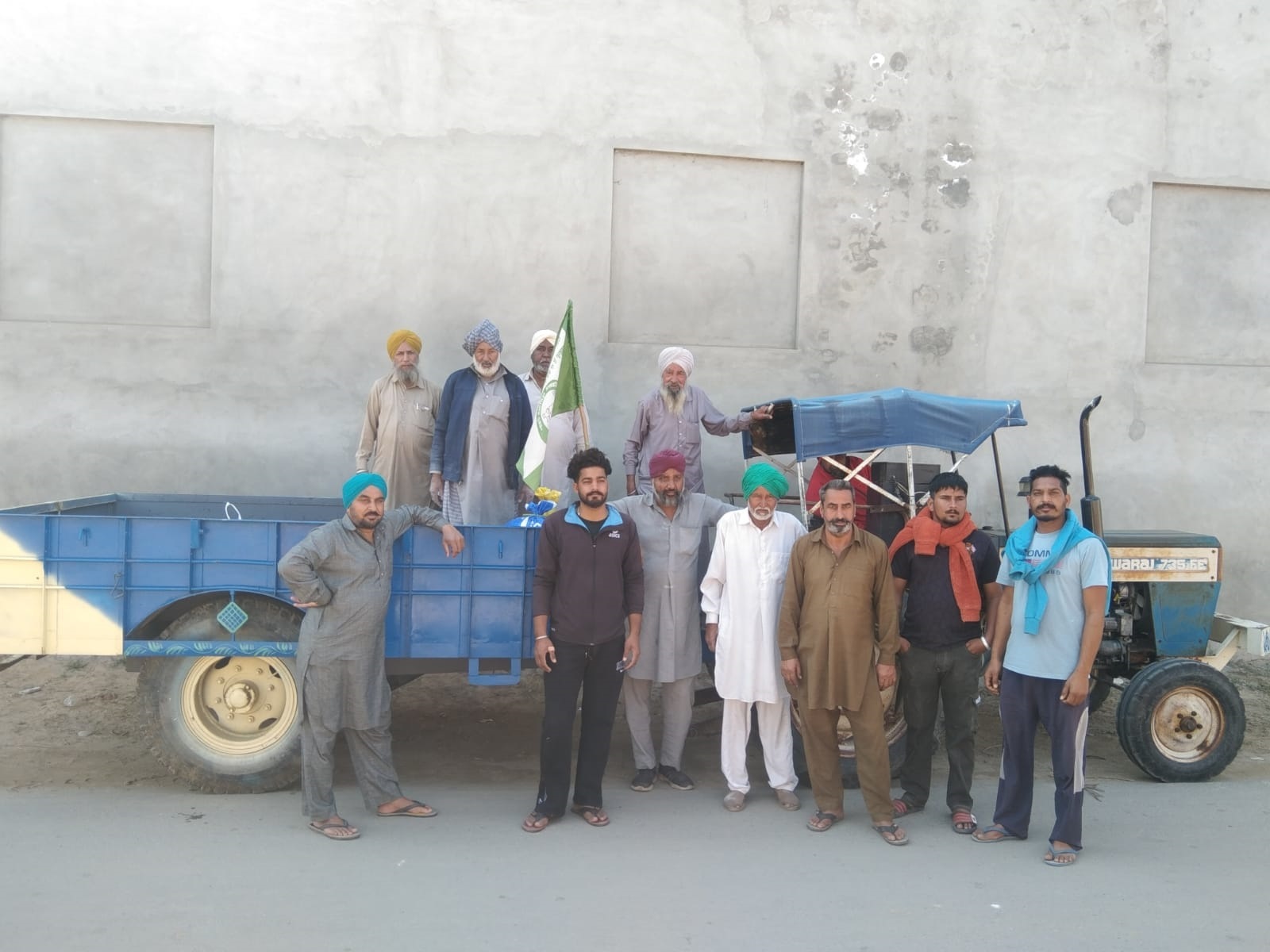‘We’re ready for Delhi 2.0’: Amid talks as Punjab and Haryana farmers gear up for protest, cops on alert
Ahead of the February 13 Dilli Chalo protest, farmers in Haryana and Punjab are getting ready with trolleys, tractors, mattresses and dry rations.
 Trolley with Dilli Chalo poster ready in village Talwandi Nepala of Ferozepur. (Express photo)
Trolley with Dilli Chalo poster ready in village Talwandi Nepala of Ferozepur. (Express photo)Even as the first round of talks between farmer union leaders and Union ministers Piyush Goyal, Arjun Munda and Nityanand Rai took place on a cordial note in Chandigarh on Thursday night, farmers across Punjab and Haryana are gearing up to take part in the ‘Dilli Chalo’ protest on February 13. The police forces in both states are also on high alert.
“On Friday morning, the police visited the gurdwara in Sirsa’s Bada Gura village and told the granthi that the gurdwara management should not allow farmer union leaders to make any announcements related to the farmer agitation through the loudspeaker,” Lakhwinder Singh Aulakh, president of the Bharti Kisan Ekta (Haryana), alleged. “They are visiting many other villages…this is double-speak, if talks are going on why are they resorting to such tactics?” he asked.
 Ration being gathered from Lehra Mohabbat village of Bathinda. (Express)
Ration being gathered from Lehra Mohabbat village of Bathinda. (Express)
Aulakh further alleged that even sarpanches are being told not to allow people to lend tractor-trolleys to farmers. “If anyone will lend his vehicle such as a bus, a van etc for the Dilli Chalo morcha, they will cancel the registration certificate of that vehicle,” he added.
In Punjab too, police are on alert, tracking the movements of farmers.
At the Shambhu border, while the Haryana side has placed boulders to stop the farmers, temporary barricades have been enhanced on the Punjab side. These iron barricades are on wheels and can be removed. On November 26, 2020, when farmers marched towards Delhi, they threw most of these temporary barricades into the Ghaggar river flowing along the Shambhu border.
With trolleys, mattresses and rations, protesters get ready
“From our village, a trolley full of farmers will take part in the morcha. They are ready with waterproof sheets, mattresses etc. Dry ration will also be carried. We are ready for Delhi 2.0,” Balwinder Singh, a farmer from Talwandi Nepala village in Punjab’s Ferozepur district said. “Similarly, several villages will send one trolley each if the government does not agree to our demands,” Balwinder, who is from the Kisan Mazdoor Sangharsh Committee (KMSC), said.
Ranbir Singh Rana, a KMSC member from Thath village in Ferozepur said he would take two trolleys from his village. “No doubt talks are on but we are ready…if talks fail, our morcha will be ready to move towards Delhi,” he explained.
 Villagers of Kotra Korianwala of Bathinda district with their tractor-trolley. (Express photo)
Villagers of Kotra Korianwala of Bathinda district with their tractor-trolley. (Express photo)
Tony Lehra from Lehra Mohabbat village in Bathinda said that villagers have donated rations for the farmers. “We have 24 quintals of wheat, 160 kg of wheat flour, 46 kg of rice, 20 kg of jaggery, around 10 kg of tea leaves, 16 kg of ghee and various other ration items…all have been donated by villagers. The government should not underestimate us. Delhi 2.0 or Dilli Chalo will happen if demands are not met,” he said.
Kaka Singh Kotra, leader of Bharatiya Kisan Union (BKU) Sidhupur added, “Our union operates from 19 districts of Punjab and a few trolleys from each district will go to Delhi if nothing comes out of the talks.”
The ‘Dilli Chalo’ call has been given by the Samyukta Kisan Morcha (non-political) and the Kisan Mazdoor Morcha (KMM). The farmers are demanding minimum support price (MSP) on all crops, punishment for the culprits in the Lakhimpur Kheri incident, quashing of all FIRs lodged during the farmers’ agitation and Rs 10,000 per month pension for farmers beyond the age of 60, among other demands.
The SKM (non-political) claims to be a body of over 150 farmer unions from across the country with Jagjit Singh Dallewal as its coordinator. It is an offshoot of the SKM, a flagship body of over 500 farmer unions in India that protested against the farm laws.
The KMM is a body of over 100 farmer unions from Punjab, Haryana, Himachal Pradesh, Tamil Nadu, Telangana, Uttar Pradesh, Rajasthan etc. Though it was only formed last week, most of the unions under its banner had fought against farm laws in coordination with the SKM earlier.
The SKM is not part of the ‘Dilli Chalo’ protest and has given a call for a ‘Grameen Bharat Bandh’ on February 16. It will observe the bandh in coordination with trade unions, industrial unions, bank employees unions, transport employees, government employees associations and several other associations.







